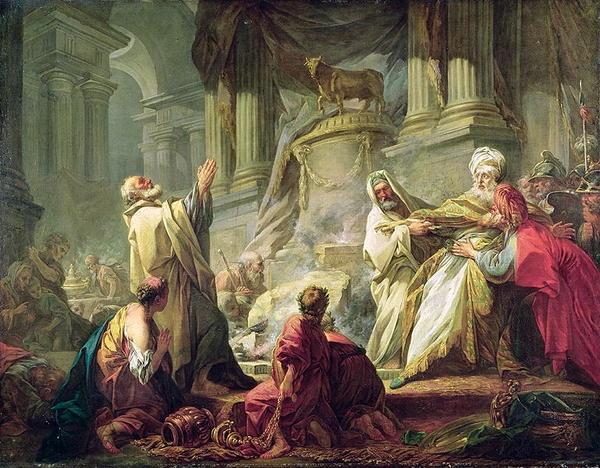
by
Damien F. Mackey
“For the statutes of Omri are kept, and all the works of the house of Ahab,
and you walk in their counsels; that I should make you a desolation, and the inhabitants
thereof an hissing: therefore you shall bear the reproach of my people”.
Micah 6:16
With the obscure King Omri (qua Omri) now expanded into Jeroboam I:
Great King Omri missing from Chronicles
then it becomes somewhat clearer what may have been “the statutes of Omri” as referred to by the prophet Micah.
They were the unorthodox religious laws and teachings of Jeroboam I.
And they had much of their inspiration from Egypt, where Jeroboam lived prior to his reign in Israel. King Jeroboam even uses the very same description of his golden calves that the MBI Israelites had used of theirs in the desert:
Cf.
(Exodus 32:4): ‘These are your gods, Israel, who brought you up out of Egypt’.
(I Kings 12:28): ‘Here are your gods, Israel, who brought you up out of Egypt’.
Here, then, are the statutes of Omri = Jeroboam I (I Kings 12:26-33):
Jeroboam thought to himself, ‘The kingdom will now likely revert to the house of David. If these people go up to offer sacrifices at the temple of the Lord in Jerusalem, they will again give their allegiance to their lord, Rehoboam king of Judah. They will kill me and return to King Rehoboam’.
After seeking advice, the king made two golden calves. He said to the people, ‘It is too much for you to go up to Jerusalem. Here are your gods, Israel, who brought you up out of Egypt’. One he set up in Bethel, and the other in Dan. And this thing became a sin; the people came to worship the one at Bethel and went as far as Dan to worship the other.
Jeroboam built shrines on high places and appointed priests from all sorts of people, even though they were not Levites. He instituted a festival on the fifteenth day of the eighth month, like the festival held in Judah, and offered sacrifices on the altar. This he did in Bethel, sacrificing to the calves he had made. And at Bethel he also installed priests at the high places he had made. On the fifteenth day of the eighth month, a month of his own choosing, he offered sacrifices on the altar he had built at Bethel. So he instituted the festival for the Israelites and went up to the altar to make offerings.
Micah compares, but also distinguishes between, “the statutes of Omri … and all the works of the house of Ahab”.
For, as we read in the above-mentioned article, Omri and Ahab - though universally thought to have been successive rulers of Israel - in reality belonged to separate houses, that of Jeroboam and that of Ahab.
No comments:
Post a Comment